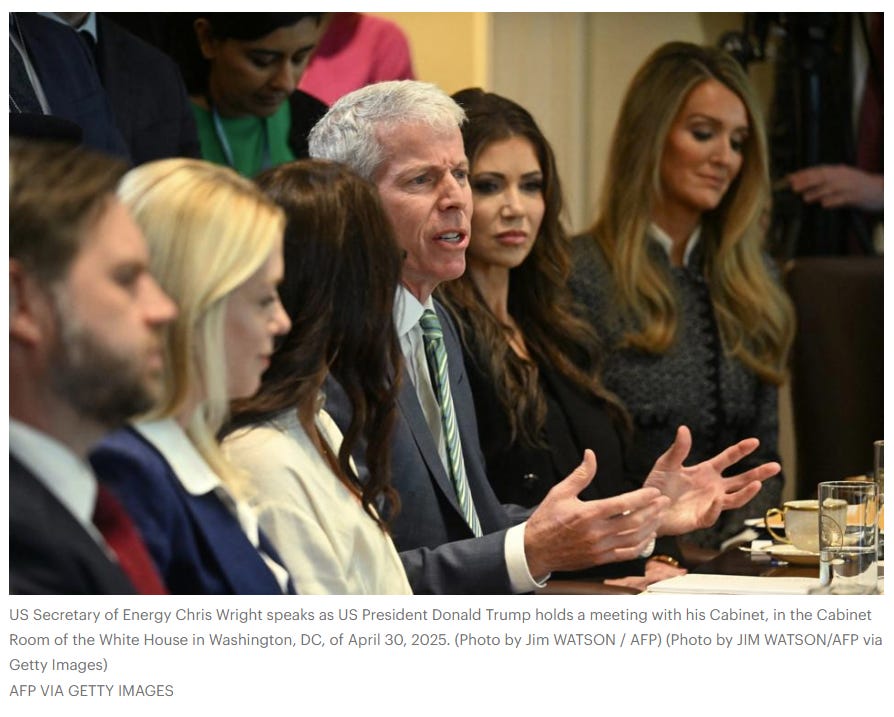
ENB Pub Note: This article is from the Substack of David Blackmon, and Michael and I will be covering it in tomorrow’s daily standup. We highly recommend following and subscribing to David Blackmon here: https://blackmon.substack.com/
In a move demonstrating that big oil companies aren’t the only targets of energy-related lawsuits, a coalition of state attorneys general led by Texas AG Ken Paxton recently sued major investment firms including BlackRock, Vanguard and State Street. The complaint, filed last December in a Texas federal court, alleges that the defendants illegally colluded to buy up stock in various coal companies and force them to lower output via implementation of internal ESG-focused policies.
Mr. Paxton said in a press release introducing the lawsuit that the big investment firms have created a “cartel to rig the coal market, artificially reduce the energy supply, and raise prices,” adding, “their conspiracy has harmed American energy production and hurt consumers.” But U.S. coal prices have dropped dramatically since 2023, and overall coal production has been in decline throughout the 21st century.
Are you Paying High Taxes in New Jersey, New York, or California?
Despite coal’s decline, America’s mineral energy renaissance has transformed our country’s outlook, enhancing its energy security in the process. Once heavily dependent on foreign suppliers to meet demand, last year the U.S. produced more mineral energy than ever before – and output is projected to increase further this year.
This extraordinary turnaround is in large part the result of free markets being allowed to do what they do best: compete. This is certainly the case in the oil and gas business, where thousands of producers ranging from small mom-and-pop operators to the biggest major integrated companies in the world compete in a vibrant marketplace. It has even remained true in the coal industry despite an array of command-and-control interventions enacted during both the Obama and Biden presidencies.
Mr. Paxton and some of the Republican AGs who have signed onto the plaintiff coalition have been outspoken proponents of President Donald Trump and his efforts to reverse much of the Biden and Obama regulatory morass. So, regardless of the merits of the complaint, it is at least interesting that the group’s lawsuit proposes a big government solution.
That proposed remedy asks that that the government force these asset managers to divest their holdings in coal companies entirely, a move that could strip the industry of nearly $18 billion in capital. That could be ruinous to a sector which has been in decline for decades. It would also present real trouble for Energy Secretary Chris Wright’s goal of delaying planned retirements of more than 100 gigawatts of coal-fired power plants, which he discussed in President Trump’s August 26 cabinet meeting. After all, it costs real money to pay for the upkeep and operations of that many coal power plants. Somebody has to foot the bill, and it won’t be the federal government.

Former Texas Governor Rick Perry, who served as Energy Secretary throughout the first Trump presidency from 2017-2021, called the lawsuit “misguided” last month in a Washington Times op-ed. Perry warned that a decision for the plaintiffs would likely undermine Trump’s energy agenda, calling the case “not conservative. That’s not pro-business. And it’s certainly not pro-energy dominance.”
Surely, there must be more constructive ways to debate energy policy. In fact, the last election served in many ways as a referendum on the Biden-Harris administration’s aggressive green agenda – one that Trump and his cabinet officials say made a mess of America’s energy security.
Should the plaintiff states prevail in this case, what would that mean for the many oil and gas companies who adopted many of the same ESG-focused internal policies which these coal companies implemented in their efforts to adapt to the political and market realities of the moment to maximize investor returns? Those companies were advised every day of every week for years to move in that direction by an array of major advisory firms for whose advice they paid millions of dollars.
This kind of litigation also raises the specter of the tables being reversed whenever the political pendulum swings back in the other direction, which it inevitably will do. The resulting tit-for-tat governance might chill investment and raise the cost of capital at precisely the time when large-scale energy investments are most needed.
During the 2024 campaign, President Trump promised to reinvigorate “beautiful, clean coal” as part of an all-of-the-above energy plan – a laudable goal to meet America’s rapidly growing energy needs. Shoring up resilience and reliability on the nation’s power grids by ensuring the maintenance of adequate 24/7 baseload generating capacity is a major piece of that agenda. Secretary Wright and other Trump officials believe coal still has a big role to play in that space.
Achieving the President’s vision will require serious investment by the private sector as government subsidies are gradually removed from the equation, and much of that capital investment must be provided by the defendant firms in this case. Policymakers should be working to unleash capital markets, not jam them up.
But, despite that reality, the Trump Justice Department’s antitrust division and Federal Trade Commission tacitly endorsed the lawsuit in July with the filing of a statement of interest, saying the actions by the defendants could reduce competition and raise prices for consumers. This begs the question of who the agencies believe will step in to pony up $18 billion in new capital to fund the ongoing operations of the 100 gw of coal plants Sec. Wright wants to keep in operation if the government forces this mass divestiture. It isn’t as if alternative investors are clamoring at the gates to invest in the coal business these days.
Regardless of the ultimate outcome of this litigation targeting Blackrock and other big investment houses, it serves to vividly illustrate the complexities endemic to investing big money in the energy business in the United States today. None of this is simple or easy: If it was, everybody would be doing it.
This extraordinary turnaround is in large part the result of free markets being allowed to do what they do best: compete. This is certainly the case in the oil and gas business, where thousands of producers ranging from small mom-and-pop operators to the biggest major integrated companies in the world compete in a vibrant marketplace. It has even remained true in the coal industry despite an array of command-and-control interventions enacted during both the Obama and Biden presidencies.
Mr. Paxton and some of the Republican AGs who have signed onto the plaintiff coalition have been outspoken proponents of President Donald Trump and his efforts to reverse much of the Biden and Obama regulatory morass. So, regardless of the merits of the complaint, it is at least interesting that the group’s lawsuit proposes a big government solution.
That proposed remedy asks that that the government force these asset managers to divest their holdings in coal companies entirely, a move that could strip the industry of nearly $18 billion in capital. That could be ruinous to a sector which has been in decline for decades. It would also present real trouble for Energy Secretary Chris Wright’s goal of delaying planned retirements of more than 100 gigawatts of coal-fired power plants, which he discussed in President Trump’s August 26 cabinet meeting. After all, it costs real money to pay for the upkeep and operations of that many coal power plants. Somebody has to foot the bill, and it won’t be the federal government.

Former Texas Governor Rick Perry, who served as Energy Secretary throughout the first Trump presidency from 2017-2021, called the lawsuit “misguided” last month in a Washington Times op-ed. Perry warned that a decision for the plaintiffs would likely undermine Trump’s energy agenda, calling the case “not conservative. That’s not pro-business. And it’s certainly not pro-energy dominance.”
Surely, there must be more constructive ways to debate energy policy. In fact, the last election served in many ways as a referendum on the Biden-Harris administration’s aggressive green agenda – one that Trump and his cabinet officials say made a mess of America’s energy security.
Should the plaintiff states prevail in this case, what would that mean for the many oil and gas companies who adopted many of the same ESG-focused internal policies which these coal companies implemented in their efforts to adapt to the political and market realities of the moment to maximize investor returns? Those companies were advised every day of every week for years to move in that direction by an array of major advisory firms for whose advice they paid millions of dollars.
This kind of litigation also raises the specter of the tables being reversed whenever the political pendulum swings back in the other direction, which it inevitably will do. The resulting tit-for-tat governance might chill investment and raise the cost of capital at precisely the time when large-scale energy investments are most needed.
During the 2024 campaign, President Trump promised to reinvigorate “beautiful, clean coal” as part of an all-of-the-above energy plan – a laudable goal to meet America’s rapidly growing energy needs. Shoring up resilience and reliability on the nation’s power grids by ensuring the maintenance of adequate 24/7 baseload generating capacity is a major piece of that agenda. Secretary Wright and other Trump officials believe coal still has a big role to play in that space.
Achieving the President’s vision will require serious investment by the private sector as government subsidies are gradually removed from the equation, and much of that capital investment must be provided by the defendant firms in this case. Policymakers should be working to unleash capital markets, not jam them up.
But, despite that reality, the Trump Justice Department’s antitrust division and Federal Trade Commission tacitly endorsed the lawsuit in July with the filing of a statement of interest, saying the actions by the defendants could reduce competition and raise prices for consumers. This begs the question of who the agencies believe will step in to pony up $18 billion in new capital to fund the ongoing operations of the 100 gw of coal plants Sec. Wright wants to keep in operation if the government forces this mass divestiture. It isn’t as if alternative investors are clamoring at the gates to invest in the coal business these days.
Regardless of the ultimate outcome of this litigation targeting Blackrock and other big investment houses, it serves to vividly illustrate the complexities endemic to investing big money in the energy business in the United States today. None of this is simple or easy: If it was, everybody would be doing it.
Avoid Paying Taxes in 2025
Crude Oil, LNG, Jet Fuel price quote
ENB Top News
ENB
Energy Dashboard
ENB Podcast
ENB Substack






